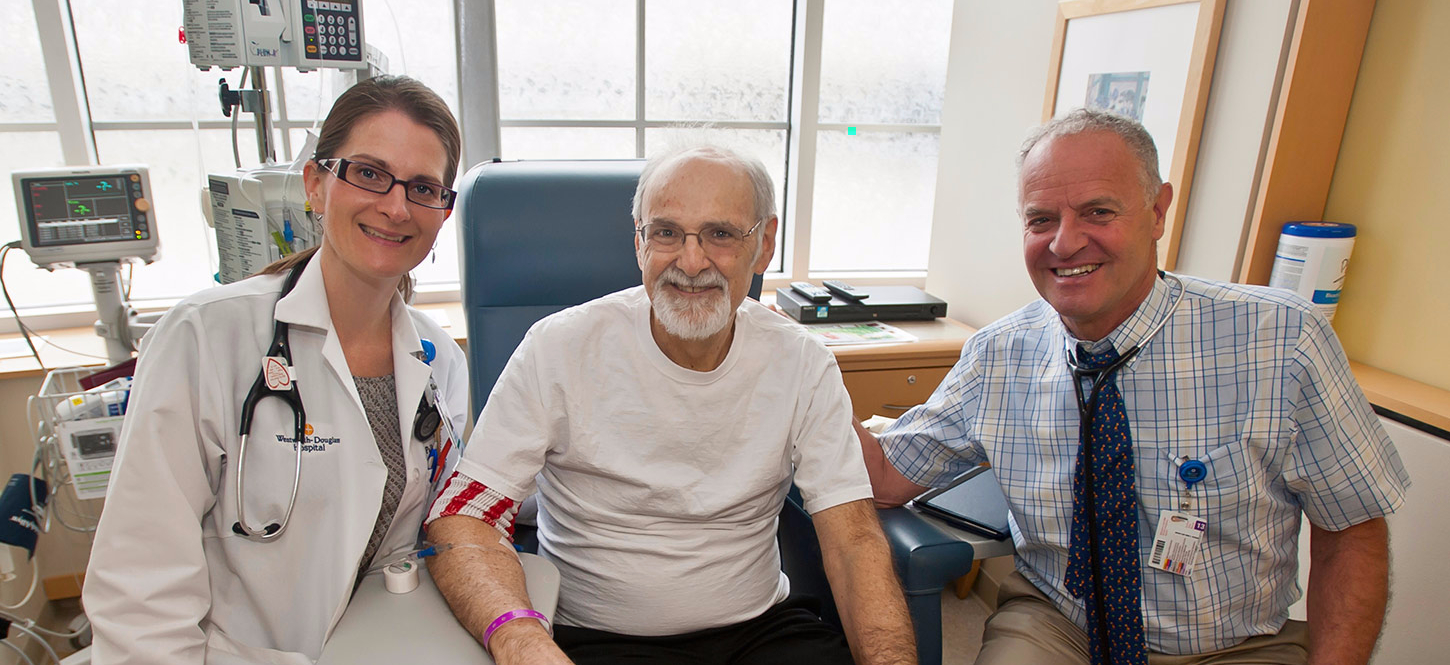11/25/2014
Brad's Story: Supportive & Palliative Care
The first time Brad met Dr. Agata, he had the most important conversation of his life. Brad Hadley, 62, of South Berwick, Maine, came to the Wentworth-Douglass Hospital Emergency Department on March 6, 2014 with a persistent cough. His taste was changing. His stomach was bloated. Further evaluation revealed the possibility of cancer in multiple places in Brad’s body. This was a shock because Brad’s annual doctor’s appointment four months before revealed normal blood test results and good overall health.
Brad left the hospital on March 8 only to return nine days later in kidney failure and extreme pain – the disease was advancing quickly. His Medical Oncologist from the Seacoast Cancer Center, Henry Sonneborn, MD, told him the images and test results did not look good. While Brad tried to come to grips with his prognosis, Dr. Sonneborn requested a consultation from the Medical Director of Supportive & Palliative Care at Wentworth-Douglass Hospital, Agata Marszalek, MD.

“The cancer came on quickly and aggressively,” said Brad, “and the plan was to attack it back quickly and aggressively with chemotherapy. My concern was that I was on a one-way path with no control, whether it was working or not. Dr. Agata told me I always have options – I could change my mind if I wanted. That was the most important conversation I’ve ever had. She said she would do everything in her power to keep me feeling good. That’s when I began to understand that I have a team working with me to make the best choices.”
The best news Brad could hear in that moment was he still had some control over what happened to him. The Supportive & Palliative Care team was there to support him and help him treat all his side effects from the cancer and the cancer treatment – pain, swollen legs, lack of taste, nausea, heartburn, dry mouth and more. Dr. Agata’s goal was to make him feel as comfortable as possible, whether he decided to go through the full regimen of cancer treatment, parts of the cancer treatment or no cancer treatment at all.
“When I met Brad, I saw a man that was struggling with pain, nausea, apprehension and stress, but also a man who understood the severity of his situation,” said Dr. Agata. “One of my goals is to restore hope. For some, the hope is to be cured. For others, the hope is to feel as good as possible for as long as they live.” Dr. Agata met with Brad and his wife of 40 years, Patricia, for two hours in Brad’s hospital room.
Dr. Agata helped the couple understand the current situation and how to prepare for the future. Brad’s main concern was his family. After filling out Advanced Directives (Living Will and Durable Power of Attorney) and situating his finances, Brad and Dr. Agata were able to focus on physical and mental health to support both Brad and his family.
“If I’m not feeling well, then my wife is worried,” said Brad. “If she’s a mess, then I’m a mess. Dr. Sonneborn treats my cancer and does an amazing job. Dr. Agata can focus on how to make my quality of life better. I’m so thankful they value treating patients with a team approach.”
In this visit, Brad’s leg swelling is down to a comfortable level and he is losing the bloated belly that was keeping him from his normal-sized jeans. He is thankful for Dr. Agata’s special skills and passion. “One thing that is amazing about her is that she can pick up on things that I don’t notice,” said Brad. “We treat it and then I’m feeling better. There are things you can do. You don’t have to put up with everything.”
Brad is not the only one who appreciates the skill of Dr. Agata and the services of the Supportive & Palliative Care team. Dr. Sonneborn intently describes how important this medical subspecialty is to the whole healthcare team. “It is not only about having the best chemotherapy possible. It’s about having the best treatment possible,” said Dr. Sonneborn. “My patients are so happy that all of their needs are met and I am amazed at how invaluable this service has become.”
Supportive & Palliative Care is also an important piece in the Wentworth-Douglass Health System (WDHS). Jeffrey Hughes, WDHS Vice President and Chief Strategic Officer, says the service supports and enhances the Health System’s mission. “With Supportive & Palliative Care, we can take a step back and take a look at the whole patient,” said Jeff. “We are focused on meeting the needs of our patients and their families, and it is the right thing to do.” Supportive & Palliative Care can help patients at any point in their chronic disease process. The service provides help for patients and families to understand and plan for their future and communicate and make decisions with other healthcare providers while improving the patient’s quality of life.
“We can take the time to get to know the patients and their families as well as their values,” said Dr. Marszalek. “We help them validate what they are going through. For me, the great part about my work is getting to meet people like Brad and hearing their stories. Brad is an intriguing guy!”
“Cancer treatment and treatment for life are two different things,” said Brad. “And I’m glad I have a team to work on both. From the staff in the Seacoast Cancer Center to the nurses on the floor, the physicians, the social workers, the nutrition staff, the volunteer named Maurizio who plays guitar as a therapy for patients, and everyone in between, you can tell they all want to be here and that passion shows in their work.